#british legal system
Text
A British Columbia lawyer alleged to have submitted bogus case law “hallucinated” by an AI chatbot is now facing both an investigation from the Law Society of B.C. and potential financial consequences.
Earlier this month, it was revealed that lawyer Chong Ke allegedly used ChatGPT to prepare legal briefs in a family law case at B.C. Supreme Court.
In reviewing the submissions, lawyers for the opposing side discovered that some of the cases cited in the briefs did not, in fact, exist.
Those lawyers are now suing Ke for special costs in the case.
Full article
Tagging: @politicsofcanada
#cdnpoli#canada#canadian politics#canadian news#canadian#british columbia#BC#law society of BC#Chong Ke#AI#chatgpt#law#legal#legal system#BC supreme court
91 notes
·
View notes
Text
Find it so interesting how people hate the law because it seems so against them, yet fail to see the ways in which the law works against the systems that attempt to exploit people, and thus works for them. Of course, law is never perfect, and there's a lot of injustices and disadvantages; no doubt about it. But it is just very funny how personal people seem to take it. Some might argue that law should be more personal, should accommodate specifically for every minute circumstance. Others will argue that law is a little like an indiscriminate blade that will cut regardless of whose blood is drawn, that it is black and white, right and wrong. We aim for the middle ground between personal and the law. Perhaps one could argue that the law serves whoever knows how to wield it. Whoever can pay for someone who knows to wield it. Therefore, law itself is actually rather neutral, and it is the hand holding the blade that decides the nature of how it is used. How, then, can you hate the law? Can you, or should you, truly hate something you do not understand? Do you hate the law, or do you hate the ones wielding it?
#I'm actually just procrastinating my work by rambling bullshit#don't mind me#this comes from an australian and british law perspective#not american#because I am not american and know very little about america or its legal system
3 notes
·
View notes
Text
In the wake of the D*pp stuff I’ve been seeing an idea perpetuated by otherwise very smart and well-meaning people that if a judge finds x to be true through their fact finding, it is UNDENIABLY true. It is not a good idea to put your unquestioning faith into judges like this. Jury trials are flawed, yes, but so are bench trials… your fate rests on someone who has to act as though they are an expert in multiple fields of knowledge, and most of them just don’t have that requisite knowledge to be making fair, just determinations. And as they work to uphold the law (which is in itself mired in slavery, colonialism, misogyny) they are influenced by their own biases. Most judges come from certain backgrounds, and even if they came into their office with the hopes of changing things for the better, they are still working within these often completely unjust confines of the laws. In some areas (particularly those with the highest populations of Black Americans), most judges started out as prosecutors and are super buddy-buddy with the DA’s office. Idk man. Judges are cops, too.
#don’t even get me started on elections and appointments#anyway ya BOO JUDGES!#i know people are discussing the UK judgments but ugh guess what legal system is based on the British legal system too!!
19 notes
·
View notes
Text

I don't know if you're American or not but in my experience as a person who is not American, American events and media are so incredibly loud and visible that they tend to leech into everything.
Like I'm Canadian born and raised and can name more American presidents than I can Canadian Prime Ministers. I have Canadian friends from Canada who can accurately describe themselves as Liberals but are still sorta foggy on NDP policies. Do you know what day Canada Day is? It's July 1st. Do you know what's on my dashboard on July 1st? Early posts about July 4th.
And if you're an American reading this: Or, hell, anyone else reading this: We all know George Washington was the first American President. Do you know who the first Prime Minister of Canada was? Can you name two British political parties? What are two countries that have Monarchies, not Democracies? What was the most recent political scandal you can think of that took place outside the US? What's your favourite TV show that takes place anywhere outside of America? What are your top three favourite non-american musicians? If English is your first language, how many foreign countries can you go to where you don't speak the language, but don't have to worry about it?
I said "International America Day" as a joke, but there is a very real phenomenon in countries outside of the US where the general population becomes Americanized through the prevalent American media.
We know American current events, we know American scandals, we know about American cops and American movies and American accents and American fast food chains. We have serious opinions on the American legal system and we talk about American law and American policy and American celebrities, and many of us don't know Jack Shit about what's going on where we live.
I'm Canadian. I've heard all about 'building the wall' and ICE and Jan 6th, the intentional government distribution of narcotics in Black communities and the use of Marijuana Illegalization to persecute Black and Mexican people under the Nixon administration.
Do you know what Canada did to Chinese immigrants to build the Canadian railroad? What about the Sterilization Act? Residential Schools? Do you know what a Status Card is? Does it, or does it not cost money to ride in an ambulance? Can people with breasts legally walk around topless? What's the legal drinking age? What are our biggest cities? Who was our least-popular PM? What are our allied nations? Where does the Canadian military get deployed?
"International America Day" was a goof. But Jesus, it's a little bit serious
*edit: yeah I wrote June instead of Jan my bad
#Politics#America#Canada#History#Idk boys I m growing up and learning what I don't know and it's scary#America just Does This
4K notes
·
View notes
Text
Constraining Shari‘a: Postcolonial Legal Politics
As in #BritishSomaliland, postcolonial authorities in the #SomaliRepublic used the law to achieve their political goals. 70% of #Somaliland population rejected Jun 1961 #referendum, saying gov't in #Mogadishu favored southern #Somalis’ priorities, sidelining those of northerners
(more…)

View On WordPress
#Act of Union#Authoritarian#British Somaliland#British Somaliland Protectorate#constitution#Democracy#Independence#Islam#Islamic Law#Judiciary#Law#Legal#Legal System#Mark Fathi Massoud#Postcolonial#Religion and Spirituality#Religious#Rule of law#Shari‘a Inshallah#Siyad Barre#Somali Republic#Somalia#Somaliland
0 notes
Text
British administration in India
British administration in India
British administration in India
The British administration in India began in seed in 1600 AD with the establishment of the East India Company. By 1755, the East India Company had well established its existence as a trading institution. After the Plassey war of 1757 AD, the foundation of British power in India was laid. The period from 1773 to 1858 was what we call the ‘period of double rule’.…

View On WordPress
#British administration in India#British Crown ruled#British Parliament#central administration#Constitutional Development#Development of other institutions#Development order of public service#East India Company#governance systems and legislative#independent democratic institutions#Indian administrative structure#Parliament and Parliamentary#period of double rule#Plassey war of 1757 AD#Revenue and legal system#state-level administrations
1 note
·
View note
Text
The number of incarcerated young offenders in British Columbia has fallen so dramatically that the province needs to come up with a plan to reallocate resources to avoid waste, a report released Thursday says.
The report from the office of Jennifer Charlesworth, B.C.'s representative for children and youth, says the average daily number of youth in custody in the province has fallen from 386 in 1997-98 to as low as 11 in 2021-22.
The "dramatically decreased" figures meant there were 11 staff for every youth in custody at dedicated facilities.
Full article
Tagging: @politicsofcanada
#cdnpoli#canada#canadian politics#canadian news#canadian#british columbia#BC#incarceration#legal system
42 notes
·
View notes
Text
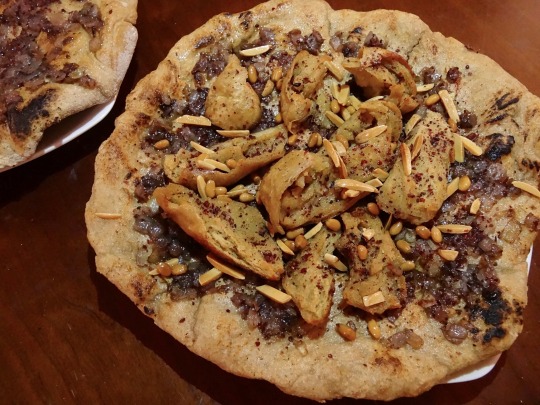

[ID: Two large flatbreads. The one in the center is topped with bright purple onions, faux chicken, fried nuts, and coarse red sumac; the one at the side is topped with onions and sumac. Second image is a close-up. End ID]
مسخن / Musakhkhan (Palestinian flatbread with onions and sumac)
Musakhkhan (مُسَخَّن; also "musakhan" or "moussakhan") is a dish historically made by Palestinian farmers during the olive harvest season of October and November: naturally leavened flatbread is cooked in clay ovens, dipped in plenty of freshly pressed olive oil, and then covered with oily, richly caramelized onions fragrant with sumac. Modern versions of the dish add spiced, boiled and baked chicken along with toasted or fried pine nuts and almonds. It is eaten with the hands, and sometimes served alongside a soup made from the stock produced by boiling the chicken. The name of the dish literally means "heated," from سَخَّنَ "sakhkhana" "to heat" + the participle prefix مُـ "mu".
I have provided instructions for including 'chicken,' but I don't think the dish suffers from its lack: the rich, slightly sour fermented wheat bread, the deep sweetness of the caramelised onions, and the true, clean, bright expressions of olive oil and sumac make this dish a must-try even in its original, plainer form.
Musakhkhan is often considered to be the national dish of Palestine. Like foods such as za'tar, hummus, tahina, and frika, it is significant for its historical and emotional associations, and for the way it links people, place, identity, and memory; it is also understood to be symbolic of a deeply rooted connection to the land, and thus of liberation struggle. The dish is liberally covered with the fruit of Palestinian lands in the form of onions, olive oil, and sumac (the dried and ground berries of a wild-growing bush).
The symbolic resonance of olive oil may be imputed to its history in the area. In historical Palestine (before the British Mandate period), agriculture and income from agricultural exports made up the bulk of the economy. Under مُشَاعْ (mushā', "common"; also transliterated "musha'a") systems of land tenure, communally owned plots of land were divided into parcels which were rotated between members of large kinship groups (rather than one parcel belonging to a private owner and their descendants into perpetuity). Olive trees were grown over much of the land, including on terraced hills, and their oil was used for culinary purposes and to make soap; excess was exported. In the early 1920s, Palestinian farmers produced 5,000 tons of olive oil a year, making an average of 342,000 PL (Palestinian pounds, equivalent to pounds sterling) from exports to Egypt alone.
During the British Mandate period (from 1917 to 1948, when Britain was given the administration of Palestine by the League of Nations after World War 1), acres of densely populated and cultivated land were expropriated from Palestinians through legal strongarming of and direct violence against, including killing of, فَلّاَحين (fallahin, peasants; singular "فَلَّاح" "fallah") by British troops. This continued a campaign of dispossession that had begun in the late 19th century.
By 1941, an estimated 119,000 peasants had been dispossessed of land (30% of all Palestinian families involved in agriculture); many of them had moved to other areas, while those who stayed were largely destitute. The agriculturally rich Nablus area (north of Jerusalem), for example, was largely empty by 1934: Haaretz reported that it was "no longer the town of gold [i.e., oranges], neither is it the town of trade [i.e., olive oil]. Nablus rather has become the town of empty houses, of darkness and of misery". Farmers led rebellions against this expropriation in 1929, 1933, and 1936-9, which were brutually repressed by the British military.
Despite the number of farmers who had been displaced from their land by European Jewish private owners and cooperatives (which owned 24.5% of all cultivated land in Palestine by 1941), the amount of olives produced by Palestinians increased from 34,000 tons in 1931 to 78,300 in 1945, evidencing an investment in and expansion of agriculture by indigenous inhabitants. Thus it does not seem likely that vast swathes of land were "waste land," or that the musha' system did not allow for "development"!
Imprecations against the musha' system were nevertheless used as justification to force Palestinians from their land. After various Zionist organizations and militant groups succeeded in pushing Britain out of Palestine in 1948—clearing the way for hundreds of thousands of Palestinians to be dispossessed or killed during the Nakba—the Israeli parliament began constructing a framework to render their expropriation of land legal; the Cultivation of Waste Lands Law of 1949, for example, allowed the requisition of uncultivated land, while the Absentees’ Property Law of 1950 allowed the state to requisition the land of people it had forced from their homes.
Israel profited from its dispossession of millions of dunums of land; 40,000 dunums of vineyards, 100,000 dunums of citrus groves, and 95% of the olive groves in the new state were stolen from Palestinians during this period, and the agricultural subsidies bolstered by these properties were used to lure new settlers in with promises of large incomes.
It also profited from the resulting "de-development" of the Palestinian economy, of which the decline in trade of olive oil furnishes a striking example. Palestinian olive farmers were unable to compete with the cheaper oils (olive and other types) with which Zionist, capital-driven industry flooded the market; by 1936, the 342,000 PL in olive oil exports of the early 1920s had fallen to 52,091 PL, and thereafter to nothing. While selling to a Palestinian captive market, Israel was also exporting the fruits of confiscated Palestinian land to Europe and elsewhere; in 1949, olives produced on stolen land were Israel's third-largest export. As of 2014, 12.9% of the olives exported to Europe were grown in the occupied West Bank alone.
This process of de-development and profiteering accelerated after Israel's military seizure of the West Bank and Gaza in 1967. In 1970, agriculture made up 34% of the GDP of the West Bank, and 31% of that of Gaza; in 2000, it was 16% and 18%, respectively. Many of those out of work due to expropriated or newly unworkable land were hired as day laborers on Israeli farms.
Meanwhile, Palestinians (and Israeli Palestinians) continued to plant and cultivate olives. The fact that Palestinians do not control their own water supplies or borders and may expect at any time to be barred by the military from harvesting their fields has discouraged investment and led to risk aversion (especially since the outmoding of the musha' system, which had minimized individual risk). In this environment, olive trees are attractive because they are low-input. They can subsist on rainwater (Israel monopolizes and poisons much of the region's water, and heavily taxes imports of materials that could be used to build irrigation systems), and don't require high-quality soil or daily weeding. Olive trees, unlike factories and agricultural technology, don't need large inputs of capital that stand to be wasted if the Israeli military destroys them.
Olive trees are therefore the chosen crop when proving a continued use of land in order to prevent the Israeli military from expropriating it under various "waste" or "absentee" land laws. Palestinians immediately plant olive seedlings on land they have been temporarily forced from, since even land that has lain fallow due to status as a military closed zone can be appropriated with this justification. The danger is so pressing that Palestinian agronomists encouraged this habit (as of 1993), despite the fact that Israeli competition and continual planting had lowered olive crop prices, and despite the decline in soil quality that results from never allowing land to lie fallow. In more recent years, olive trees have yielded primary or supplementary income for about 100,000 Palestinian families, producing up to 191 million USD in value in good years (including an average of 17,000 tons of olive oil yearly between 2001 and 2009).
Israeli soldiers and settlers have famously uprooted, vandalized, razed, and burned millions of these olive trees, as well as using military outposts to deny Palestinian farmers access to their olive crops. It prefers to restrict Palestinians to annual crops, such as vegetables and grains, and eliminate competition in permanent crops, such as fruit trees.
This targeting of olive trees increases during times of intensified conflict. During the currently ongoing olive harvest season (November 2023), Gazan olive farmers have reported being targeted by Israeli war planes; some farmers in the West Bank have given up on harvesting their trees altogether, due to threats issued by organized networks of settlers that they would kill anyone seen making the attempt.
The rootedness of olive trees in the history of Palestine gives them weight as a symbol of homeland, culture, and the fight for liberation. Palestinian olive harvest festivals, typically celebrated in October with singing, dancing, and eating, have inspired similar events elsewhere in the world, aimed at sharing Palestinian food and culture and expressing solidarity with those living under occupation.
Support Palestinian resistance by calling Elbit System’s (Israel’s primary weapons manufacturer) landlord, donating to Palestine Action’s bail fund, and donating to the Bay Area Anti-Repression Committee bail fund.
Ingredients:
For the dish:
2 pieces taboon bread, preferably freshly baked
2 large or 3 medium yellow onions (480g)
1 cup first cold press extra virgin olive oil (زيت زيتون البكر الممتاز)
1 Tbsp coarsely ground Levantine sumac (سماق شامي / sumaq shami), plus more to top
Ground black pepper
For the chicken (optional):
500g chicken substitute
5 green cardamom pods, or 1/4 tsp ground cardamom
4 cloves, or pinch ground cloves
1 Mediterranean bay leaf
1 Tbsp ground sumac
For the nut topping (optional):
2 Tbsp slivered almonds
2 Tbsp pine nuts
Neutral oil, for frying

Notes on ingredients:
Use the best olive oil that you can. You will want oil that has some opacity to it or some deposits in it. I used Aleppo brand olive oil (7 USD a liter at my local halal grocery).
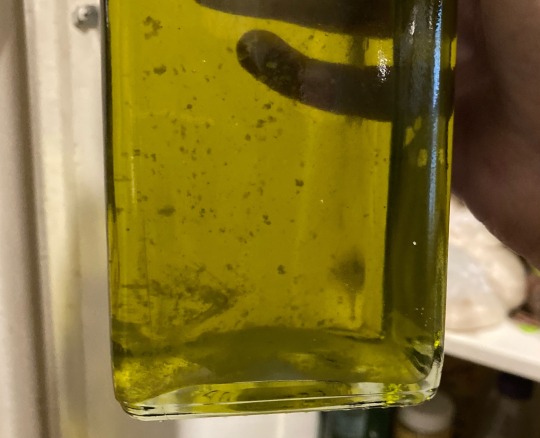
If you want to replace the taboon bread with something less laborious, I would recommend something that mimics the rich, fermented flavor of the traditional, whole-wheat, naturally leavened bread. Many people today make taboon bread with white flour and commercial yeast—which you might mimic by using storebought naan or lavash, for example—but I think the slight sourness of the flatbread is a beautiful counterpoint to the brightness of the sumac and the sweetness of the caramelized onions. I would go with a sourdough pizza crust or something similar.
Your sumac should be coarsely ground, not finely powdered; and a deep, rich red, not pinkish in color (like the pile on the right, not the one on the left).

For this dish, a whole chicken is usually first boiled (perhaps with spices including bay leaves, cardamom, and cloves) and then baked, sometimes along with some of the oil from frying the onions. I call for just frying or baking instead; in my opinion, boiling often has a negative effect on the texture of meat substitutes.
Instructions:
For the onions:
1. Heat a cup of olive oil in a large skillet or pot. Fry onions on medium-low, stirring often, for 10 minutes or until translucent.

2. Add 1 Tbsp sumac and a few cracks of black pepper and reduce to low. Cook for another 30 minutes, stirring occasionally, until onions are sweet, reduced in volume, and pinkish in color.
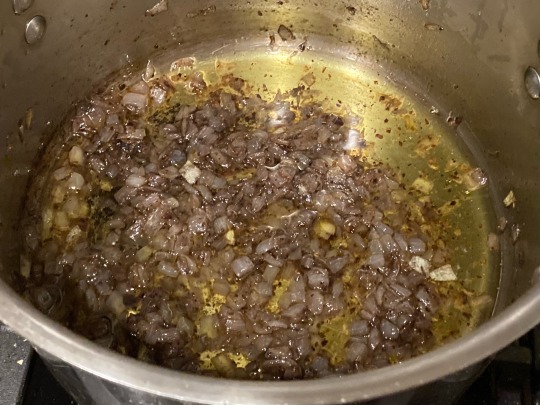
For the chicken:
1. Briefly toast and finely grind spices except for sumac (cardamom, cloves, and bay leaf). Filter with a fine mesh sieve. Dip 'chicken' into the pot in which you fried the onions to coat it with olive oil, then rub spices (including sumac) onto the surface.
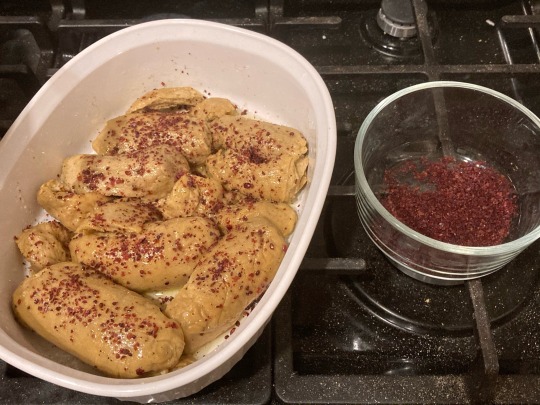
2. Sear chicken in a dry skillet until browned on all sides; or bake, uncovered, in the top third of an oven heated to 400 °F (200 °C) until browned.
For the nut topping:
1. Heat a neutral oil on medium in a small pot or skillet. Add almonds and fry for 2 minutes, until just starting to take on color. Add pine nuts and fry until both almonds and pine nuts are golden brown. Remove with a slotted spoon.
To assemble:
1. Dip each flatbread in the olive oil used to fry the onions, then spread onions over the surface.
Some cooks dip the bread entirely into oil; others press it lightly into the surface of the oil in the pot on both sides, or one side; a more modern method calls for mixing the olive oil with chicken broth to lighten it. Consult your taste. I think the bread from my taboon recipe stands up well to being pressed into the oil on both sides without tearing or becoming soggy.
2. Top flatbread with chicken and several large pinches more sumac. Bake briefly in the oven (still heated to 400 °F / 200 °C), or broil on low, for 3-5 minutes, until the sumac and the surface of the bread have darkened a shade.
3. Top with fried nuts.
Musakhkhan is usually eaten by ripping the chicken into bite-sized pieces, tearing off a bit of bread, and eating the chicken using the bread.
Some cooks make a layered musakhkhan, adding two to three pieces of bread covered with onions on top of each other before topping the entire construction with chicken and pine nuts.
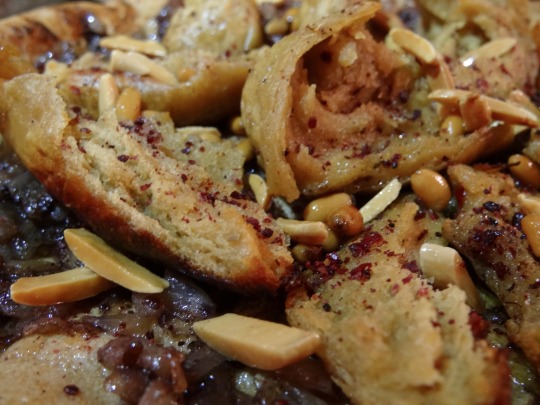
668 notes
·
View notes
Text
Splatoon 3 is wild because imagine if you were living in Japan due to a recent economic and cultural boom, and suddenly a space shuttle with a mutant house-sized T-rex riding it suddenly burst from the center of Mt. Fuji and disappeared into space without explanation, and all you ever find out about what the fuck that was about is that Zuckerburg mysteriously disappeared the same day and was never seen again, but still "officially" ran Meta through an open secret Queen-Elizabeth-being-in-good-health gaslighting campaign, and everybody kind of suspected he may have been connected but never figured out anything conclusive.
Also the T-rex is now orbiting the earth in the fetal position like the guy from Jojo, and there are rumors of a substance that, if touched, turns you into a half-dinosaur monster. Nobody understands any of this but Meta employees just keep going to work and pretending Zuck still exists. The same 12 prerecorded voicelines constantly squak from the PA system.
Oddly, the statue in front of Meta HQ of a T-rex eating a human changes overnight into one of a giant human eating a tiny T-rex. Nobody noticed the switch, despite the statue being in a constantly bustling area. It happened shortly after the shuttle incident.
Jack Black's tiny clone, Lil' Jack, now wears a headset at all times and has been acting really shady since the incident. Also they're both hyperintelligent, immortal velociraptors found in an ancient cryogenic chamber who spend their days judging college football and eating the legally harvested flesh of hillbillies. Lil' Jack is probably plotting to kill Big Jack, but Big Jack doesn't seem to care, growing fat and lazy, sleeping on public benches in a bed of throw pillows. Also, he's very open about the fact that, as a velociraptor, humans look delicious, but he hasn't actually eaten anybody aside from the aforementioned hillbillies because he's civil.
Everyone is just expected to move on with their lives after this. This is normal to you.
The local art school was recently attacked by giant sea serpents, which were actually hideously bioengineered hillbillies, fulfilling a biblical doomsday prophecy, and they were driven back by Meta's army of minimum wage, part time child soldiers armed with warcrimey jury-rigged weaponry. The sea serpents had giant frying pans grafted into their mouths, which launched primitive tactical nukes made by filling garbage bags with their explosive blood. They still exist, and occasionally defend their comrades, but spend most of their time in the deep sea.
The local homeless emo twink everyone's attracted to is a closet millionaire who sells bootleg clothing in exchange for live rats, which he messily devours behind closed doors. He's also 8 feet tall and British and only has one eye.
North Korean refugees now flood the western world, after a greasy 14 year old hipster, under the guidance of Ariana Grande and Taylor Swift, beat Kim Jong Un in a mech battle, and the EDM remix of the Japanese national anthem they performed caused like half the soldiers to immediately realize North Korea sucks ass and defect. One of these individuals, 7 foot tall hypergenius, becomes a newscaster alongside a nepo baby rapper with dwarfism who likes to eat entire jars of mayo, and also they're a popular band. Also also, they may or may not be gay. Almost the entire population is gay, so this isn't a huge deal.
The new local newscasters are a famous Japanese lion tamer, an Indian girl with a bloodline trait allowing her to control snakes, and a Brazillian man the size of a smart car who exclusively communicates via grunts.
Gods, souls and zombies are objectively real, and you're effectively immortal because real-life respawning was invented a while ago. It works like a Keurig, but with mucus instead of coffee. Submersion in water kills you.
A good deal of the population is a hivemind. They pretend to be individuals for no reason.
Almost all men are now femboys.
Despite all this, you still have to go to work at 9 tomorrow.
#splatoon 3#splatoon#splatoon fandom#splatpost#splatposting#splatoon lore#mr. grizz#new agent 3#neo agent 3#return of the mammalians
402 notes
·
View notes
Text
Can someone tell me why John Oliver is trending?
I don't mind.
I do enjoy that owlish British man's mud-raking style journalism on modern and historic institutions that typically reveals abuses of power in the most mundane of systems and establishments, while encouraging viewers to help change society for the better and also having an overall "I have the money to fuck with people/establishments I hate in a legally secure way, while also buying wonderfully useless nonsense!" vibe that makes you wonder how he gets away with it all.
But why is he specifically trending now?
#john oliver#last week tonight#is this a good time to post my last week tonight bingo card/ drinking game
151 notes
·
View notes
Text
So this OTW Election drama is getting out of hand...
I see a lot of panic and fearmongering, and I think some facts need to be stated to help put things into perspective.
The OTW, which operates AO3, has yearly elections for the Board of Directors. This is position which is occupied by SEVEN PEOPLE total. You can see the members of the current board here: https://www.transformativeworks.org/board-directors/
The entire Board of Directors works together to oversee the OTW as a whole. They cannot and also do not oversee the details of day-to-day operations, such as your tags being wrangled, or keeping track of donations, or responding to support tickets, or keeping the servers working, etc. (https://elections.transformativeworks.org/what-the-board-does/)
Therefore, ONE person being elected to the Board will not be able to completely shift the direction and goals of the OTW as a whole. You would need a 4 person majority at the very least, and the maximum number of seats up for election in any year is usually 3.
The requirements for running for the Board are fairly simple: 9 months in the previous year as a volunteer (everyone in the OTW, including Board members, are volunteers), not being in the Elections committee, being a legal adult, and being a paying member (basically the same as being a voter in the election). More info: https://elections.transformativeworks.org/becoming-candidate/
There is no nomination process or any sort of internal popularity contest at play here. Any views being expressed by a candidate therefore doesn't mean anything about the OTW's culture internally as a whole.
There is a period of time before the election where all eligible voters get emails at the same email address they will send the ballots to, with instructions to a mock-up page of the ballot so that people can work out technical issues if needed. People who need accommodations for any reason are also able to request them during this period weeks before the election. So asking for a "tech testing" period before the election happens is... pointless. It's already there!
Asking for more "screening" of candidates is reasonable on the surface, but the truth is, it could be ripe for abuse by people in charge of the process. Sure, perhaps the people who put these rules into place won't use the process badly, but who's to say nobody will ever be tempted to do so? It could lead to a Board and Elections Committee that works together to keep new ideas and changes in the OTW from ever coming to fruition. Just imagine the Board of Directors we hate in movies: old white men in suits who never want anything to change, and only let in people who are just like them. Also -- the reason we have elections AT ALL is so everyone gets a voice in how the OTW will run.
This isn't like the US Election (or British, or wherever you are) where your vote is one drop in an ocean of millions. The OTW and AO3 are actually not that big in the wider world, and that means each vote counts more. Also, the ranked voting system means peoples' votes can count towards their second- or third-favourite candidate, or so on. It's not all or nothing here!
I know a lot of people are worried seeing what seems like anti views coming from "within" the OTW itself, but it is still one person out of hundreds. People are always going to have varying opinions; the GOOD thing is that people are voting against opinions that they don't agree with. That means the voting process is working.
There is a conversation to be had, perhaps, about changing some policies and requirements for candidates and members future elections. But right now? Breathe.
There is no risk of the AO3 censoring and banning fic overnight, even if you personally cannot vote this year. After all, the candidates weren't revealed until after everyone donated, and we know antis would never give AO3 their money.
(And for the conspiracists out there: ballot-stuffing is not 100% impossible, but EXTREMELY UNLIKELY. You would need to have paid 10$ donations for HUNDREDS if not THOUSANDS of fake people (which is $$$$) months in advance and also set up hundreds/thousands of email accounts for all these fake people, or for real people with nefarious aims. The reason we know the moon landing wasn't faked is because that many people could not have realistically kept a secret for that long. We would have heard whispers about it. The same applies here. This entire debacle came out of left field over the course of a few days!
And all that work, for ONE member who can't unilaterally change anything? Please.)
#just leave candidates you don't like off your ballot#ao3#otw#fanfic#fanfiction#fandom#elections#archive of our own#psa#signal boost
5K notes
·
View notes
Text

Susato Mikotoba is a unique and refreshing addition to the Ace Attorney series, as she is not a typical legal assistant who mainly provides comic relief or emotional support. Instead, she is a competent and confident young woman who has a keen interest in law and literature and who actively contributes to the defense's arguments and investigations. She is also one of the few female characters in the series who has the opportunity to act as a defense attorney herself, albeit under a male disguise.
Susato's skills and intelligence are evident from her first appearance in the series, where she helps Ryunosuke Naruhodo prepare for his trial and teaches him the basics of cross-examination. She also demonstrates her knowledge of foreign cultures and languages, as she is fluent in English and familiar with British customs and laws. She is able to adapt to the different legal system and courtroom etiquette in London, and often corrects Ryunosuke's mistakes or misunderstandings. She is also well-read and cultured, as she enjoys reading novels and poetry, and has a fondness for tea and sweets.
Susato's deductions are also impressive and often crucial to the defense's case. She is able to notice details and contradictions that others might miss, and she is not afraid to challenge the prosecution or the witnesses with her logic and evidence. She is also able to deduce the true identity and motives of some of the culprits, such as Jezail Brett, Benjamin Dobinbough, and Enoch Drebber. She is also skilled at using the Dance of Deduction, a technique that allows her to make rapid and accurate inferences based on observation and reasoning. She learned this technique from her father, Yujin Mikotoba, who is a renowned forensic scientist and a friend of the great detective Herlock Sholmes.
Susato's involvement in the investigations and trials is much more active and significant than that of most legal assistants in the series. She is not just a sidekick or a cheerleader but a partner and a collaborator who works alongside Ryunosuke and shares his passion for justice. She is also willing to take risks and make sacrifices for the sake of her clients and friends, such as disguising herself as Ryutaro Naruhodo to defend Rei Membami, or leaving Ryunosuke behind to return to Japan and take care of Kazuma Asogi's affairs.
In conclusion, Susato Mikotoba is a remarkable character who deserves more recognition and appreciation from the fans of the Ace Attorney series. She is not only a smart and capable judicial assistant but also a loyal and compassionate friend, a brave and determined lawyer, and a charming and elegant lady. She is a new bloom in the new world and a shining star in the Ace Attorney universe.
#susato mikotoba#the great ace attorney chronicles#ace attorney#i love her so much#I'm normal about her...Ok
206 notes
·
View notes
Text
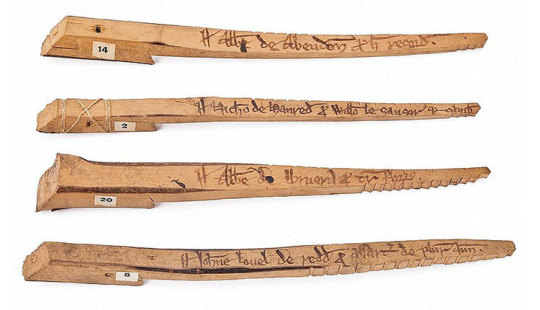
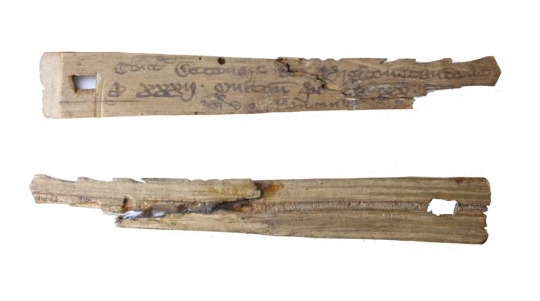
Wooden Money in Olde England,
The use of tally sticks as an accounting tool goes back to ancient antiquity and the dawn of civilization. In an age when the vast majority of people were illiterate, the simplest way represent a certain number of goods was to simply cut markings into a stick, a piece of bamboo, bone, or other similar item. Such systems were common all over the world including Europe, Asia, Africa, and the Pre-Columbian Americas. If you have, say 12 goats, you could go to the market, find an interested buyer, hold up the stick with 12 notches cut into it and say, “I have this many goats, want to make a deal?”
By the Middle Ages in Europe, Asia, and The Middle East, tally sticks were used as a record of debts, almost like a wooden credit card. An agreement to an IOU was made with the amount notched out on both sides of a stick. The stick was then split in half lengthwise, with one half held by the creditor, and the other half held by the debtor. Believe it or not this system of recording and settling debts continued well into modern times. In 1804 the use of the split tally was acknowledge as legal proof of debt in the Napoleonic Code. The split tally continued in use in Switzerland into the 20th century. When the Bank of England was founded in 1694 as a public corporation, the bank issued tally sticks to it’s investors as proof of their investments. Since the investments were recorded on stocks of wood, they became known as “stocks” and since then the use of the term “stock” for a investment in ownership of a public company has continued to this very day.
In 1100 King Henry I of England began issuing tally sticks as a form of money due to a lack of coinage in the kingdom and Europe in general at the time. The denomination of the stick would be etched onto both sides of the stick. The Dialogue Concerning the Exchequer, written in the 13th century, notes the different denominations as thus,
“The manner of cutting is as follows. At the top of the tally a cut is made, the thickness of the palm of the hand, to represent a thousand pounds; then a hundred pounds by a cut the breadth of a thumb; twenty pounds, the breadth of the little finger; a single pound, the width of a swollen barleycorn; a shilling rather narrower; then a penny is marked by a single cut without removing any wood.”
Like other split tallies, the stick was split lengthwise, with one half being circulated among the populace as money, and the other half being stored at the local exchequer’s office (treasurer). If one believed they were being cheated with a counterfeit stick, one only had to make a visit to the local exchequer and match his half of the stick with the half held by the treasurer.

The use of the split tally for money and the recording of debts ended by act of the British Parliament in 1826. In 1834 Parliament ordered the burning of thousands of ancient tally sticks representing centuries worth of wooden money and debt records to be burned. During their destruction, the chimney of the stove caught fire, resulting in a blaze that destroyed most of the Palace of Westminster.
481 notes
·
View notes
Note
Can you explain the Iran-Israel situation please?
Alright, let's get to it. Please note that I'm writing this on mobile during my lunch break, so I can't include reference/source links as much as I'd like. Thankfully, most of what I'm going to be telling you should be easily located by searching for an article on one of the following: APNews, Reuters, BBC Global News Podcast, Democracy Now!, NPR, or The New York Times. Long-term background is probably best found in videos by the YouTube channels Real Life Lore or tldr global news, or on Wikipedia if you prefer text.
The short version: Israel attacked Iran's consulate in Syria to get at some of the military commanders that were there, which is legally equivalent to attacking Iran itself. Iran responded by sending about 300 bombs at Israel, most of which were shot down in transit. Given that they still called it a success, even though it seems only one person was even hurt, my understanding is that it's very likely that they only intended the rockets to be a show of force, rather than an actual escalation, because Iran can't afford a war right now.
To support my blogging so I can move out of my parents’ house, I do have a ko-fi. Alternately, you can donate to one of the charities I list in this post OR this post.
The long version:
Okay, let's start with some background on Israel, then Iran. This is... a lot, so if you already know the broad strokes skip down to 2023.
Israel was established following WWII by the English and French, following borders the two countries had secretly drawn up decades earlier in the Sykes-Picot agreement. The intent was to give the Jewish people a place to go... or, depending on who you ask, a place to send them. Their ancestral homeland was viewed as the best choice, sort of like a deportation millennia after a diaspora. Given that WWII had just ended by the time Sykes-Picot was actually put into effect, 'getting out of Europe' was something a lot of Jews were given to agree with.
The Arab world was not happy, as that land had belonged to the Ottomans for centuries, and had long since 'naturalized' to being Arab. I'm not going to pretend to know the nuances to when people do or do not consider Palestine to have been its own nation; it was an Ottoman state until WWI, at which point it came under British control for just under three decades, and that period is known as the British Mandate of Palestine; it ended after WWII, with the creation of Israel. Palestine's land and people have sort of just been punted around from one colonizer to another for centuries.
Iran is the current form of what was once Persia. They were an empire for a very long time, and were a unitary monarchy up until the early 20th century; in 1925, Iran elected a Prime Minister who was then declared the monarch. The following several decades had Iran's monarchy slowly weakened, and occasionally beset by foreign interventions, including a covert coup by the US and UK in 1953. The country also became more corrupt throughout the 1970s due to economic policy failing to control inflation in the face of rising oil prices.
In 1979, there was a revolution that overthrew the monarchy and the elected government, replacing the system with a theocracy and declaring Iran to be an Islamic Republic, with the head of state being a religious authority, rather than an elected one. This was not popular with... most countries. 1980 saw the closure of all universities (reopened in 1983 with government-approved curriculums), as well as the taking of over fifty American hostages from the US Embassy in Iran. You may have heard about that in the context of Ronald Reagan encouraging Iran to keep the hostages until the end of Carter's term in order to force the election.
So, the West didn't like having an Islamic state because it claims to like democracy, and also because the Islamic state was explicitly anti-American and this has some Bad Effects on oil prices. The Soviets didn't like having an Islamic State because a theocracy goes directly against a lot of communist values (or at least the values they claim to have), and weakened any influence their supposedly secular union could have on Iran and the wider middle east. The other countries in the Arab world, many of them still monarchies, didn't like the Islamic republic because if the revolution spread, then it was possible their monarchies would be overthrown as well.
(Except Oman, which is not worried, but that's the exception, not the rule.)
This is not a baseless worry, because Iran has stated that this is its goal for the Arab world. Overthrow the monarchies, overthrow the elected governments, Islamic Rule for everyone. That is the purpose of its proxies, like Hezbollah (Lebanon), the Houthis (Yemen), and Hamas (Palestine), along with less well-known groups like the Salafi Jihadists in Mali, who are formally under the umbrella of al-Quaeda, which Iran denies having any relation to but is suspected of funding. In areas where these proxy groups have gained power, they are liable to enact hard Shari'a law such as has happened in Northern Mali and other parts of the Sahel region.
While other conflicts have occurred in these countries, I think the above is most relevant.
Israel has repeatedly attacked, or been attacked by, other nations in the middle east, as they are viewed as having taken over land that is not theirs, and as being a puppet of the US government. The biggest conflicts have been 1947-1948, 1968/1973, and 2014.
And then, of course, 2023.
Now, Iran, more than any other nation in the Middle East, hates Israel. They have for a very long time, viewing them as an affront to the goal of spreading Islam across the whole of the middle east, and as being a front and a staging ground for the United States and other Western powers. Two common refrains in the slogans of Iran and its proxies are "Death to America" and "Death to Israel."
Due to Iran's military power and virulence towards Israel, the United States has been funneling money to Israel for decades. It has more generally been to defend itself against the Arab world at large, but it has narrowed over the decades to being about Iran and its proxies as relations have normalized with other nations like Egypt and Saudi Arabia.
Cue October 7th, 2023. Hamas invades Israeli towns, kills some people, and takes others as hostage. Israel retaliates, and the conflict ramps up into what is by now tens of thousands of dead, some half of which are children.
In this time, Hamas's allies are, by definition, Iran and the other proxy forces. Hezbollah, being in Lebanon, share a border with Israel's north. They have been trading rocket fire across the border in waves for most of the past six months. The Houthis, down in Yemen, claim to be attacking the passing cargo ships in order to support Palestine. Given that the attacks often seem indiscriminate, and that the Houthi's control over their portion of Yemen is waning in the face of their poor governance, this is... debatable. It's their official reason, but given that "let's attack passing ships, claiming that we only attack Israeli or American ships and that it is to support Palestine" is rallying support domestically for their regime, it does seem to be more of a political move to garner support at home than about supporting Palestine.
Iran, however, has not attacked Israel. They've spoken out about it, yes, but they haven't done anything because nobody wants a regional war. Nobody can afford it right now. Iran is dealing with a domestic crisis due to oil subsidies bleeding the states' coffers dry, and the aging Ayatollah Ali Khamenei, the leader of Iran, refusing to pick a successor. They are looking at both an economic crisis and succession crisis, and a regional war would fuck up both situations further. Iran funds most of its proxies, and they can't do that, and fight a war on top of it, while their economy is in its current state. Pure self preservation says they don't want a war, especially with the ongoing unrest that's been going on for... well, basically since the revolution, but especially since the death of Mahsa Amini.
Meanwhile, in Israel, Netanyahu has been looking at corruption charges and legal issues since before the Hamas attack. It's generally agreed that if Israel were to hold new elections right now, he would lose and be replaced, and also immediately taken to court. Netanyahu wants to stay in power, and as long as the war on Hamas lasts, he is unlikely to get voted out. A change in leadership in the middle of a war is rarely a good idea for any country, and he's banking on that.
However, the war on Hamas rests on the shoulders of American money and supplies. Without that military support, Israel cannot fight this war, and America... is losing patience.
Officially, America and most of the western world have been telling Israel to not fucking escalate for the majority of the war.
There have been implied threats, more or less since Schumer's big speech about how Israel needs a new election, of American legislators putting conditions on any future aid. There have even been rumblings of aid being retracted entirely if Israel follows through on invading Raffah.
So...
American aid to Israel has, for a very long time, been given in the name of defending Israel against Iran and its proxies.
Israel has been fighting this war against Hamas for six months, killing what is by now innumerable civilians, on the power of US military aid.
Netanyahu benefits from the continued war due to domestic troubles.
Iran does not want a regional war, or really any big war, due to its own domestic troubles.
The US is, in theory, losing patience with Israel and threatening to pull the plug on unconditional support. It's very "we gave you this to fight Iran. Stop attacking civilians. If you keep attacking civilians, then you're going to have to rely on what we already gave you to fight off Iran so that you won't keep wasting it on civilians."
Israel... attacks Iran, prompting a response, and is now talking about escalating with Iran.
I am not explicitly saying that it looks to me like Israel, which is already fighting a war on two physical fronts and even more political/economic ones, has picked a fight with Iran so that America feels less like it is able to withdraw support.
I just... am finding it hard to understand why Israel, which is in fact fighting both Hamas and Hezbollah, would attack the Iranian consulate in Syria otherwise. They can't actually afford to fight this war, escalating to a full regional conflict, on a third front.
Not without pressuring American into keeping the faucet of military funding open at full blast.
To support my blogging so I can move out of my parents’ house, I do have a ko-fi. Alternately, you can donate to one of the charities I list in this post OR this post.
#phoenix politics#current events#iran#israel#hamas#houthis#hezbollah#syria#politics#united states#military funding#military aid
91 notes
·
View notes